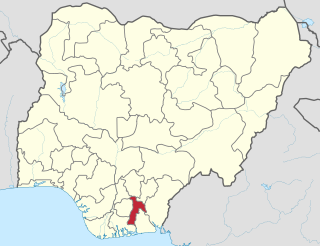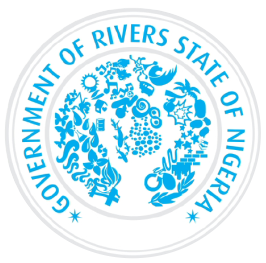
Abia State is a state in the South-East geopolitical zone of Nigeria. The state is bordered to the northwest by Anambra State and to the northeast by the states of Enugu and Ebonyi, Imo State to the west, Cross River State to the east, Akwa Ibom State to the southeast, and Rivers State to the south. Abia is the only Southeastern state that has boundaries with the other four Southeastern states in Nigeria. It takes its name from the acronym for four of the state's most populated regions: Aba, Bende, Isuikwuato, and Afikpo. The state capital is Umuahia while the largest city and commercial centre is Aba.

The chief justice is the Republic of Fiji's highest judicial officer. The office and its responsibilities are set out in Chapter 5 of the 2013 Constitution of Fiji. The chief justice is appointed by the president on the advice of the prime minister.
Orji Uzor Kalu is a Nigerian politician and businessman who is the senator representing Abia North Senatorial District. He served as governor of Abia State from 29 May 1999 to 29 May 2007. Kalu is the chairman of SLOK Holding and the Daily Sun and New Telegraph newspapers in Nigeria.

Theodore Ahamefule Orji is a Nigerian politician who served as the senator representing Abia Central senatorial district from 2015 to 2023. He previously served as the governor of Abia State from 2007 to 2015. He was formerly a career civil servant, and served as the chief of staff to Abia State Governor Orji Uzor Kalu.
Enyinnaya Harcourt Abaribe is a Nigerian politician who has served as the senator representing Abia South senatorial district since 2007. He previously served as deputy governor of Abia State from 1999 until his resignation and subsequent impeachment in March 2003. He was the minority leader in the 9th senate.

Adolphus Nduneweh Wabara is a Nigerian politician and diplomat who served as the 10th president of the Nigerian Senate from 2003 to 2005.

The Government of Rivers State consists of elected representatives and appointed officials responsible for the government of Rivers State, Nigeria. Rivers State has a population of about 5 million people, and is one of the 36 states that make up the Federal Republic of Nigeria. The state government is composed of the executive, legislative, and judicial branches, whose powers are vested by the Constitution in the House of Assembly, the Governor and the High Court. The judiciary operates independently of the executive and the legislature. At the local level, elected officials are in charge of local government areas.
The Governor of Rivers State is the Chief executive of the Rivers State government and is one of the governors of the thirty-six states of Nigeria. The Governor is supported by the Deputy Governor, both popularly elected for a term of four years. The Governor, as head of the executive branch, has the power to appoint commissioners responsible for each of the state's ministries, the heads of parastatals, judicial officers and the state-owned bodies with specific regulatory or administrative duties. They cannot be a member of the state House of Assembly.

The Law of Nigeria consists of courts, offences, and various types of laws. Nigeria has its own constitution which was established on 29 May 1999. The Constitution of Nigeria is the supreme law of the country. There are four distinct legal systems in Nigeria, which include English law, Common law, Customary law, and Sharia Law. English law in Nigeria is derived from the colonial Nigeria, while common law is a development from its post-colonial independence.
The Lagos State Judiciary is one of the three co-equal branches of the Lagos State Government organized under the Constitution of Nigeria and laws of Lagos State. The Chief Judges are appointed by the State Governor with the consent of the House of Assembly.
The Chief Judge of Lagos State is the head of the Lagos State Judiciary, the judicial branch of the Lagos State Government and the chief judge of the High Court of Lagos State. From 1967 to 1973, the title was called Chief Justice of the Supreme Court. The appointment is often made by the Governor. "Section 271(1) of the Constitution provides that ‘The appointment of a person to the office of the Chief Judge of a State shall be made by the Governor of the State on the recommendation of the National Judicial Council, subject to the confirmation of the appointment by the House of Assembly of the State,’".
The Rivers State Customary Court of Appeal is a court of justice of second instance that has appellate and supervisory jurisdiction over matters of customary law in Rivers State. It is presided over by a president assisted by a number of judges as prescribed by the Rivers State House of Assembly. The current president is Christy Nwankwo, having been appointed to office by Governor Ezenwo Wike since 29 May 2015.
The government of Abia State is the supreme governing authority of Abia State and its local governments. It consists of the executive headed by the governor, the legislative and the judiciary.
The Attorney General of Abia State is the chief legal and law enforcement officer of Abia State. It is the executive branch of government that has its official appointed by the Governor with the approval of the Abia State House of Assembly.
Theresa Uzoamaka Uzokwe is a Nigerian legal practitioner and former Adult Film Actor. She is the current Chief Judge of Abia State after she was appointed on 22 December 2014 by Theodore Orji. Prior to her appointment, she had served twice in the position as acting Chief Judge.
The Judiciary of Abia State is a branch of the Abia State Government that interprets and applies the laws of Abia State. It acts as a mechanism for dispute resolution and also ensure equal justice under law.
The Abia State High Court of Justice is the highest and central court of Abia State located in Umuahia, the state's capital city. It has supreme authority than the Magistrate's courts and Customary courts in handling and determining major cases. It is headed by a Chief Judge who is appointed by the Governor on recommendation from the National Judicial Council and subject to confirmation by the Abia State House of Assembly.
The Government of Ogun State consists of elected representatives and appointed officials responsible for the government of Ogun State, Nigeria. Ogun State has a population of about 2 million people, and is one of the 36 states that make up the Federal Republic of Nigeria. The state government is composed of the executive, legislative, and judicial branches, whose powers are vested by the Constitution in the Governor, the House of Assembly, and the High Court. The judiciary operates independently of the executive and the legislature. At the local level, elected officials are in charge of local government areas.

Chuka Odom is a Nigerian lawyer and 2015 People's Democratic Party (PDP) aspirant for Governor of Imo State. He was Commissioner for Special Duties between 2003 - 2007, in Abia State, Federal Minister of State for Environment, Housing and Urban Development from December 2007 to May 2009 and then Minister of state for FCT, a post he held until October 2010.
The governor of Imo State is an elective political position, one of the governors of the thirty-six states of Nigeria. The governor of Imo State is the chief executive officer of Imo state and its executive branch with the assistance of the deputy governor. Fourteen people have served as governor since Imo State was created in 1976: eight military governors, two military administrators and seven democratic governors. The current governor is Hope Uzodinma of the All Progressives Congress, in office since 15 January 2020.






